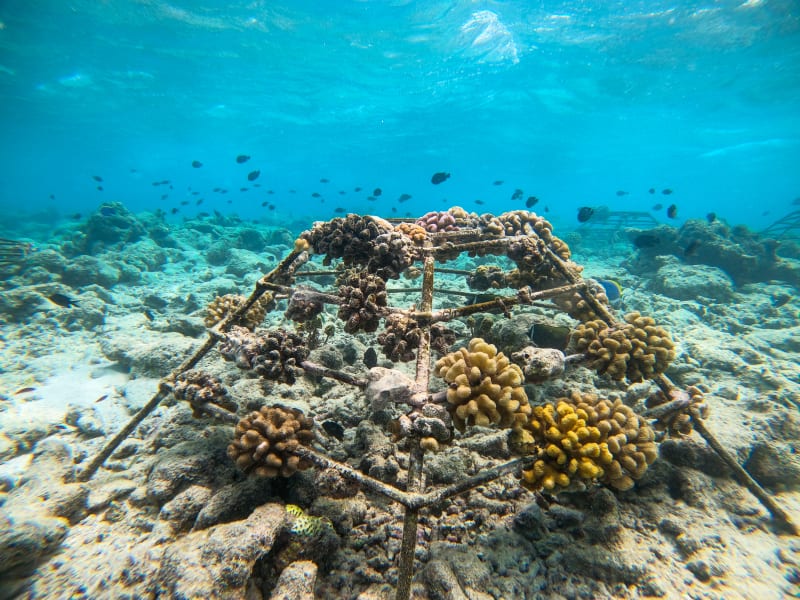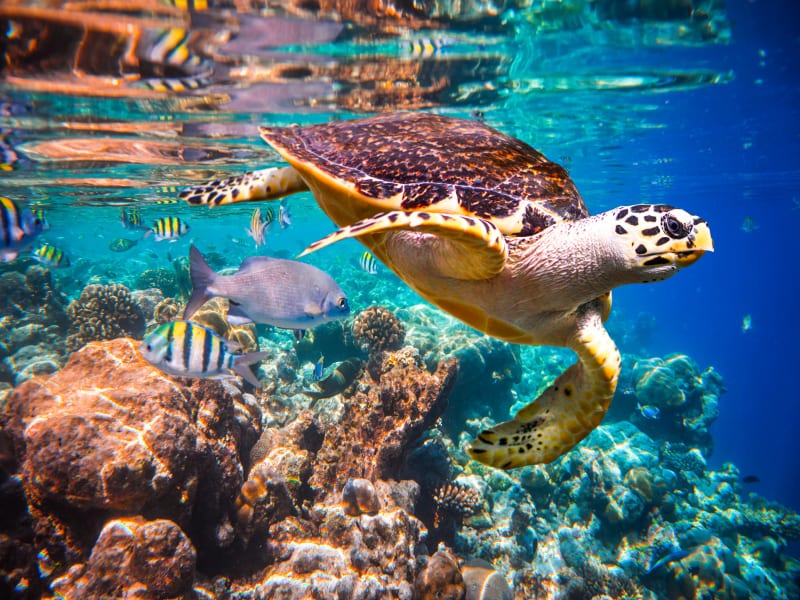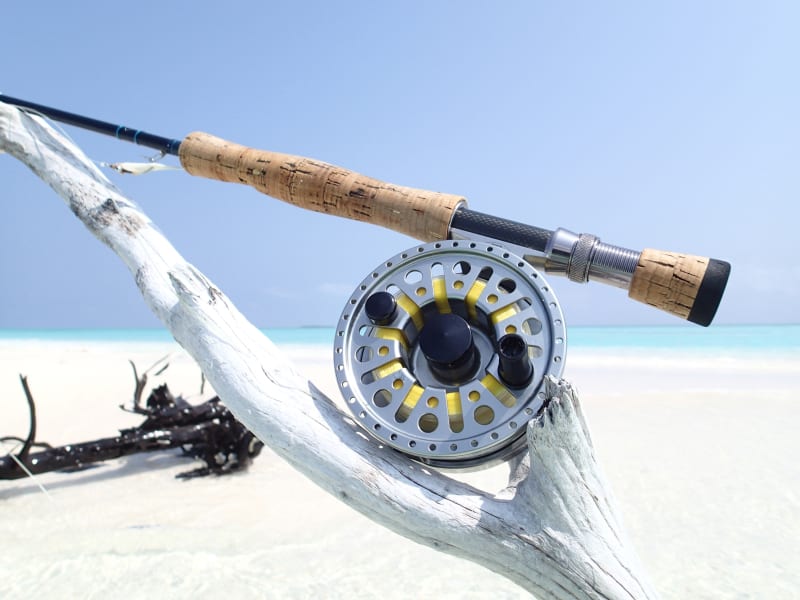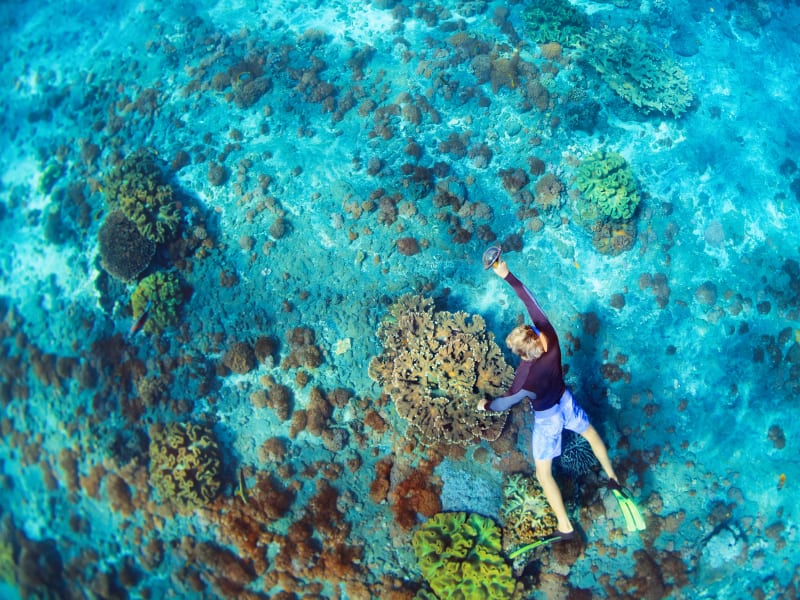The islands of Maldives are on the verge of disappearing. As climate change becomes more evident with each passing year, Maldives is among the first few nations to dramatically feel its effects.
A well-known fact about the Maldives is that it is the world’s flattest country. As a result, ocean waters rising at an alarming rate have already placed the Maldives in a do-or-die state.
If the government, locals, and global powers do not take immediate action against climate change, this paradise-like holiday destination will undoubtedly be underwater by the end of the century.
In an effort to delay this imposing and catastrophic future, the government of the Maldives, along with its residents and resorts, have been working tirelessly to protect the diverse and vibrant environment of the 1192 islands. Both below and above the water.
Sustainable travel in the Maldives might still be an option for tourists. However, there is a growing demand that everyone involved needs to focus on making sure their holiday does not leave a negative impression on the islands.
From activities helping inject new life into the surroundings to pollution control, here are some brilliant initiatives for tourists looking to enjoy an eco-friendly holiday in the Maldives.
[caption id=“attachment_9082” align=“aligncenter” width=“800”]

Corals growing on a special coral frame in the Maldives[/caption]
Coral nurseries
Coral bleaching is a disastrous phenomenon. It is when the sea’s rising water temperature results in corals releasing the algae that protect it. As a result, corals turn white and die.
The Maldives suffered two significant coral bleaching events, once in 1998 and then again in 2016. The 2016 occurrence was on a global scale and a result of a Pacific Ocean El Niño that started in 2014. During these events, the Maldives lost over 60% of its corals.
Additionally, several Maldivian islands have had to undertake reclamation projects due to the need for more land. Taking over the sea to increase area eventually has long-lasting negative consequences on the nearby lagoons and reefs.
Keeping these issues in mind, coral reef restoration in the Maldives has been ongoing ever since 2005.
At the base of this enterprise is the creation and placement of metal frames at strategic underwater locations. Attached to the structures are live corals that help** regenerate the barren habitat**.
In about four to five years, the “coral frames” create a thriving eco-system that includes the formation of new reefs. Moreover, the colorful reefs attract other sea creatures that depend on corals to survive.
The positive impacts of coral nurseries are manifold. For example, the locals building the frames for these underwater greenhouses can earn from this exercise. The island of Fulhadhoo is particularly known for its frame-making artisans.
To familiarize tourists with the significance of coral restoration, several resorts such as Conrad Maldives and Amaya Kuda Rah have special projects. Through these sponsorship programs, guests can plant coral frames and get updates on their progress over time.
A fun activity to include as part of your sustainable travel in the Maldives, planting a coral frame is also a memorable romantic excursion for couples to do together.
[caption id=“attachment_9085” align=“aligncenter” width=“800”]

Marine conservation - a rescued turtle in the Maldives[/caption]
Resort initiatives
Over the past decade, resorts in the Maldives have started to play a meaningful role in environmental conservation. While limited to individual islands, these actions aim at encouraging others to adopt similar methods that can help protect marine life.
Marine conservation
The Maldives shares its waters with many countries that have different fishing laws. This can sometimes result in foreign nets entering and disrupting aquatic life in Maldivian waters.
To safeguard sea turtles mainly, several rescue centers have come up across the country. Working in conjunction with marine biologists, these centers are state-of-the-art establishments that provide excellent medical services.
From x-rays and ultrasounds to conducting surgeries, turtles are delicately taken care of and released back into the ocean once they fully recuperate.
Recycling
Even though seawater surrounds the Maldives, clean and drinkable water is an expensive yet necessary commodity on its islands. Most of the drinkable water for tourists is available in plastic bottles. To reduce plastic bottle use, several resorts nowadays use re-fillable glass water bottles.
Going a step further, Furaveri Island Resort and Jumeirah Vittaveli have their own on-site plants to refill glass bottles with water. This change is tremendous when you consider that a simple step like this can reduce the use of 70,000 plastic bottles annually on one resort only.
On a national front, Maldives’ government announced in 2019 that it hopes to** phase out single-use plastic by 2023**. Malé now has a functional plastic recycling facility to help with this cause. A few resorts also recycle their plastic waste into tote bags. The bags are excellent Maldivian souvenirs for guests to take back home.
[caption id=“attachment_9083” align=“aligncenter” width=“800”]

The Maldives has strict fishing laws to protect its waters[/caption]
Maldives fishing laws
The Maldives faces an ongoing dilemma when it comes to fishing in its waters. On the one hand, the inhabitants rely heavily on fishing to live and earn. Along with tourism, fishing is the primary income source, with over 30% of the population involved in the fisheries industry.
Simultaneously, the government cannot allow fishing to go unmonitored. Therefore,** strict laws have been put in place** that permit locals to earn from fishing while controlling where, when, and what they can catch.
The list of fishing laws in the Maldives implemented by the government is extensive. However, here a few rules worth taking note of. They are of particular interest if you are an enthusiast and wish to fish when vacationing on the islands.
It is not allowed to fish in protected reserves. As for the resorts’ house reefs, guests have to take special permission from the management before any fishing activity.
Locals can fish around uninhabited islands and sandbars. Most fishing tours typically take guests to such locations.
One cannot fish in the Maldives using explosives, guns, or poisons of any kind.
The government prohibits the use of nets around Malé. Nor can one use nets for fishing small reef fish.
Fishing of specific marine creatures like dolphins, whales, pregnant lobsters, sea turtles, clams, black corals, and triton shells is** forbidden even in Exclusive Economic Zones**.
When indulging in sustainable travel in the Maldives, everyone must follow these rules. Moreover, visitors should speak with tour operators and check that they do not break any laws.
[caption id=“attachment_9081” align=“aligncenter” width=“800”]

A tourist swims over corals making sure not to step on them[/caption]
How to be an eco-friendly tourist in the Maldives
The burden of conserving the Maldives’ beauty does not lie solely on the government. As educated travelers, it is our responsibility to take every step possible and maintain the sanctity of the islands.
While some of the following actions might seem small, each one counts towards making sure that the Maldives has a fighting chance of survival in the coming decades.
Support local artisans
Sustainable travel in the Maldives is not just about conserving marine life. It is equally essential to assist in the growth of the local economy. To do so, travelers should plan an itinerary that includes stays and excursions operated directly by the locals.
The Maldives allowed the opening of guesthouses on inhabited islands more than a decade ago. Staying with the locals is the perfect chance to appreciate the Maldivian lifestyle and support its people.
If staying on a resort, look into booking trips to nearby inhabited islands that include interacting with artisans. You can then buy authentic products directly from them.
Respect the aquatic life
A holiday in the Maldives is all about being in the water and observing its vibrant marine life. The keyword in that sentence, though, is “observing.”
When going out into the waters to snorkel, dive, or on boat rides,** tourists mustn’t touch or feed sea animals**. More importantly, when diving or snorkeling, admire the corals from close, but without holding or stepping on them.
[caption id=“attachment_9084” align=“aligncenter” width=“800”]

Maldives resorts are now using eco-friendly products[/caption]
Use environmentally friendly products
The world is slowly becoming more and more conscious about the environment. Therefore, there are several eco-friendly products available in the market today that tourists have no excuse not to use them.
One of the most important packing list items for the Maldives is sunscreen. When buying sun protection cream, make sure you pick a reef-friendly brand. Regular sunscreen has several chemicals that enter the waters when we go swimming. An eco-friendly sunscreen is devoid of any elements that might prove harmful to marine life.
Sustainable travel in the Maldives is also about reducing our personal use of plastic in any manner. Reusable straws are an inventive option that helps decrease single-use plastic. Check with the resort if they have eco-friendly straws, or bring some of your own. They are easy to carry and wash.
Another manageable way to help nature in the Maldives is by eating food off the a-la-carte menu. Resorts undoubtedly set up lavish buffets in their restaurants, but compared to ordering individual dishes, buffets result in food wastage.
In the end, it is up to visitors to further keep the pristine nature of the islands intact. This includes not throwing garbage on the beaches or in the water.
Research your resorts
Believe it or not, but sustainable travel in the Maldives begins much before you actually book your flights. As a responsible tourist, you must research and choose the very best resort that practices eco-friendly initiatives.
Although most resorts mention their involvement in conserving the environment on their websites, it is acceptable to email them and ask for more details.
Before you book an over-the-water bungalow or a beachside villa, check to see if the resort uses solar energy. Whether transportation on the island is on electric golf carts and bicycles. Make sure they have rainwater harvesting in place. And also, if the island’s restaurants use organically grown herbs and vegetables. In fact, some resorts even use biodegradable coffee cups as a way to reduce plastic use.
Lastly, check to see how involved the resorts are with their neighboring inhabited islands. A part of sustainable travel in the Maldives is making sure tourists encourage island retreats to help the island economy further. Many resorts employ Maldivian residents and help set up schools on nearby islands. They also get the people to participate in activities with tourists, leading to a secondary income source for the locals.
